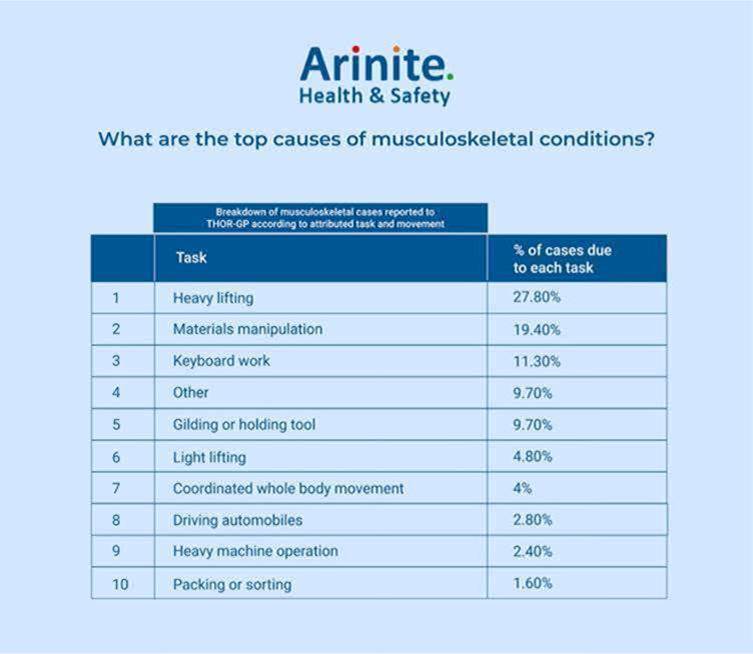Studies Show Home Workers Suffer Higher Rates of Back Pain
An independent study of over a thousand workers shows that the rate of chronic sufferers of back pain is highest among those working from home full-time. Conducted by...
Read Full ArticleWorking from beds and dining tables is contributing to a rise in work-related musculoskeletal cases.
In 2020, there were 37.7 per cent work-related musculoskeletal cases, compared to just 1.42 per cent of workers experiencing these injuries in 2019.
Data collected by health and safety consultancy film Arinite found that keyboard work is the third biggest cause of work-related musculoskeletal conditions, causing 11.3 per cent of cases.
They have also revealed that one in three office workers haven’t received any support/advice/kit from their employer for homeworking. The results conclude that those working from home aren’t getting enough support to cope with the physical change in their day-to-day work environment.
More than a quarter (28.1 per cent) of UK employees reported operating from a non-work specific home location, such as a bed, sofa or dining table. 81 per cent of employees working remotely during lockdown experienced back, neck, or shoulder pain.
Musculoskeletal disorders can affect muscles, bones, and joints. Desk jobs are common causes of these conditions, which can cause recurrent pain, swelling, aches, and stiff joints.
When severe, the discomfort experienced can interfere with everyday activities such as typing. Maintaining a healthy posture while working is vital for preventing these symptoms.
In 2019, only 1.42 per cent of workers experienced work-related musculoskeletal disorders. This low statistic may be because only 5.1 per cent of the total UK workforce were mainly working in their own home.
Whereas in 2020, many of us had no choice but to work from home. According to ONS, 46.6 per cent of British employees did some work at home during the lockdown. As a result, last year saw 37.70 per cent of musculoskeletal cases connected to work.

Picture: a table showing the top ten causes of musculoskeletal disorders, with keyboard work coming in third. Image credit: Arinite
In The Homeworking Impact Code, just over 28 per cent of UK employees admitted to operating from a non-work specific home location. Working from an inappropriate and unprofessional set-up such as slouching over a dining table, can cause neck, back, and hip pain.
Although 41.2 per cent of respondents used a dedicated workroom or office, many aches and pains can still occur without putting the necessary precautions in place.
To maintain a good posture while working at a desk:
More than a third of office workers claimed they hadn’t received any support, advice, or equipment from their employer to assist with home working during the lockdown. 89% of people who are temporarily working from home and are in pain hadn’t told their employers.
Although the law doesn’t require employers to conduct home workstation assessments for employees working from home temporarily, they should still offer advice.
According to HSE, if the temporary homeworking period extends, employers should hold regular discussions with workers to address whether improvements need making and deliver equipment if necessary.
Picture: a photograph of a person stretching to touch their neck, as if in pain. The photograph is taken from the back
Article written by Ella Tansley | Published 28 January 2021
An independent study of over a thousand workers shows that the rate of chronic sufferers of back pain is highest among those working from home full-time. Conducted by...
Read Full ArticleMost of us have probably been guilty of working in unusual places over the last eighteen months, but is your sofa desk contributing to your back pain? In 2019-20...
Read Full Article20 per cent of UK office workers feel their work is at risk of going unnoticed because of working from home. Working remotely has increased productivity and the number...
Read Full ArticleIt’s been almost a whole year of working from home for many of us, and some are predicting when offices will reopen. 54 per cent of us are apparently happy to...
Read Full ArticleLeesman has released details on what they consider to be the “acute factors” impacting employees’ ability to work remotely. A major study...
Read Full ArticleNew data has revealed that UK employees could be missing out on £4,785.30 a year due to working extra hours at home. According to a survey carried out by...
Read Full ArticleDespite 2020’s working from home revolution, five of the biggest tech giants are still demonstrating confidence in their physical office space. Recent research...
Read Full ArticleUnused office space after coronavirus could prove costly for companies, as research predicts over 70 per cent of all office rent paid by businesses in London will be...
Read Full ArticleStrategists at Deutsche Bank say that those that choose to work from home should face additional taxes, in order to support lower-paid workers. They are...
Read Full ArticleWith colder days ahead and lockdown forcing many to work from home, energy costs will increase to keep the house warm and comfortable. Unless employees are offered an...
Read Full Article